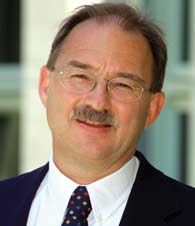|
Executive Interviews: Interview with Bill Fischer on Building High Performance Teams
May 2009
-
By Dr. Nagendra V Chowdary
- VTs start with the best people, and
a mandate to change the world
VTs are marked by assembling the best people obtainable, rather than
those merely available. They are
centered on great talent, position by
position, and then are given a license
to really pursue great change. They
are explicitly not modest! - Creating mobility for talent
In order to attain the best people
obtainable, it’s necessary for an
organization to have sufficient talent
visibility so that talent is not merely a
local asset, but a global asset. This is
frequently not the case. - Highlighting the “I’s” within the “We’s”
VTs hire people because of their
individual virtuoso talent, and then
let them be as good as they can
possibly be, rather than “averaging”
them down to some mean team. - Telling what not to do, rather than what
to do
if you go to the trouble of attracting
great people, the likelihood is that
they knowmore about their particular
field of expertise than you do, so the
leadership lesson is giving them
sufficient goal-precision, without
infringing on their ability to fully
utilize their expertise. - Double-stretching
stretch the customer first. We live in
an era of “stretch goals,” but what
surprised us was that VTs stretch
their customer first, by virtue of their
“ennobling” assumptions regarding
the sophistication of their customers
and their ability to appreciate and
willingness to pay for more complex
offerings. This is quite different than
the rather arbitrary stretch goals
[e.g.,“we’re going to double our
inventory turns this year!”… does
this really matter to anyone?] that we
typically see. - Strong central [engaged] leaders
Leadership in a Virtuoso Team is a
“contact sport.” This is about strong, central, and engaged leaders, who are
in the middle of everything, and as a
result are able to “play” their teamas if
it were a fine musical instrument. - Direct Dialog: Polite teams yield polite
results
Remember, the underlying advice for
employing VTs is that “when big
change is the goal, hire for skills and
figure out how to deal with the
attitudes.” When big change is the
objective, we need more opinions
rather than fewer, and this inevitably
requires open, honest, fast, and
constructive conversations, where
feedback is efficient and effective.
Such attributes are not characteristic
of “polite” organizations. Warren
Bennis once wrote that “great leaders
don’t waste your time;” we would
argue that VTs don’t waste your time
with false politeness, which slows
you down and misleads you. The
highest professional compliment that
you can give to a colleague is to tell
her or him the truth, in a way that
inspires them to actually achieve
more. Recognize, please, that this
does not mean rude or diminishing
commentary, but rather that VTs have
the capacity for constructive
challenge. - Prototyping
We have become big believers in the
power of prototyping as a way of
learning. Trying things, and then
learning by failing, is a fast and
powerful way to advance. If the
prototypes are simple in their
fashioning – representative rather
than precise – we can fail without
fear, as our investment in the
prototype, or the idea, is small, and
the time lost as a result of failure,
minimal. - Listening: the key leadership activity
if you are fortunate enough to
surround yourself with great talent,
then the best advice we can give you is to “listen.” Don’t tell talented
individuals what to do; listen to
what’s going on, and then try to
orchestrate situations that get more
out of their talent, rather than less. - Virtuoso teams as a “crucible” for
leadership succession
A surprise outcome for us was the
realization that the members of the
VTs that we observed, ultimately
“graduated” to becoming the leaders
of their industries in the next
generation of product offerings! The
message was this: hire great young
talent, put them into a situation
which has significant opportunity to
fully exploit that talent; a situation
that matters to the key stakeholders;
and that has a high degree of personal
risk, and then see what happens. We
believe that those who succeed in
such circumstances have a high
potential for future leadership. This,
then, becomes a “crucible” for forging
the next generation of leaders.
|
